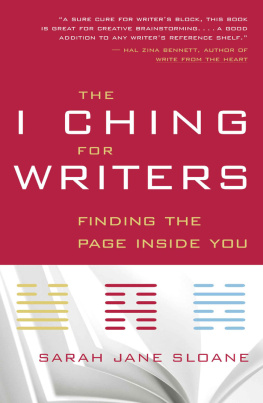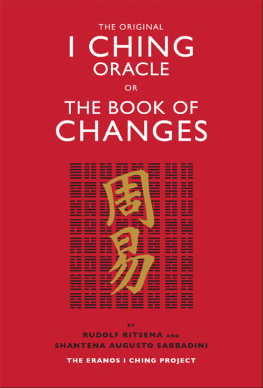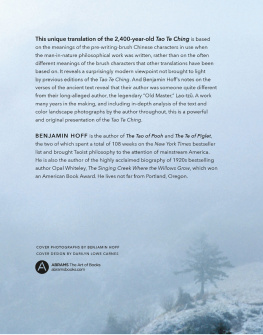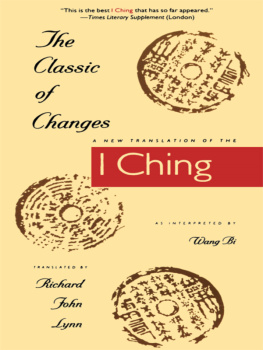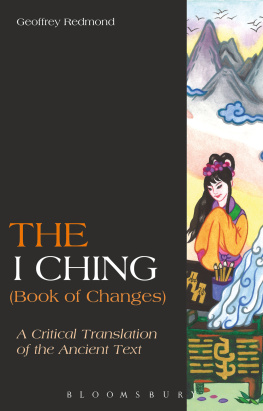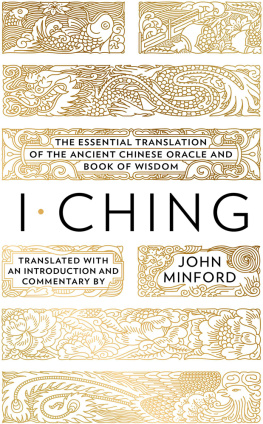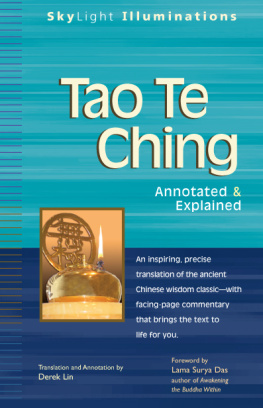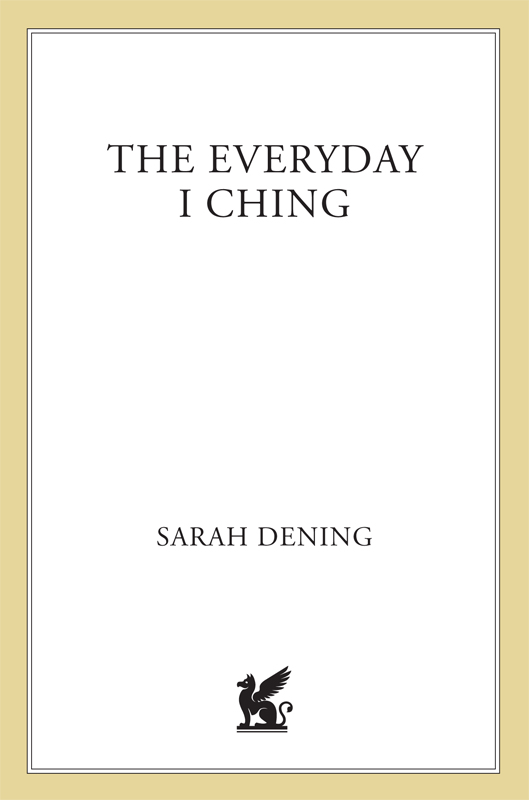
The author and publisher have provided this e-book to you for your personal use only. You may not make this e-book publicly available in any way. Copyright infringement is against the law. If you believe the copy of this e-book you are reading infringes on the authors copyright, please notify the publisher at: us.macmillanusa.com/piracy.
Contents
Dedicated with great affection and gratitude to the memory of C. G. Jung
Acknowledgements
More people than I could possibly mention here have helped to make this work possible. I am grateful to all of them. In particular, I would like to acknowledge Richard for uncomplainingly cooking the meals whilst I became a workaholic, Ian Fenton who inspired me to write this book in the first place, Shirley Dixon, Georgina Eden and Mary-Ann Pereira for their love and unfailing moral support, and last but by no means least, Ean Begg for his constant encouragement on the Way.
Introduction
The I Ching or Book of Changes originates in China and dates back to at least 3000 BC Like most very ancient wisdom it was for a long time transmitted orally. It is reputed to have first been written down around 1123 BC by King Wen and his son, the Duke of Chou. Later on, the great sage Confucius added his own commentaries.
What is the I Ching? It is a guide to the best way of dealing with any particular situation in life. The Chinese invented the compass as a way of orientating oneself in the physical world. Likewise, they created the I Ching to help us to point ourselves in the right direction in daily life. Based on the principle that everything changes constantly, it teaches us how and when and where to act. A highly practical book, the wisdom it contains is as compelling as that of the Bible.
Until about a hundred years ago, the I Ching was more or less unknown in the West. Recent years have seen it grow in popularity, together with other aspects of classical Chinese culture: Taoism, Buddhism, martial arts, acupuncture and herbal medicine. Chinese systems of healing, in particular, are the focus of ever-increasing interest in the Western world. Why is this? Unlike Western medicine which sets out to deal with the symptom, the Chinese approach is concerned with the underlying cause. This, in their view, can only be correctly diagnosed by examining the entire energy field of the patient. Such a holistic view of the body is appealing to a growing number of people. In our highly mechanized and hi-tech society, perhaps we prefer to be treated as something more than machines whose components, when they go wrong, must be repaired or replaced.
To understand how the I Ching works, we may compare it to the practice of acupuncture which is based on similar principles. The acupuncturist focuses on the flow of energy in the body. Where there are imbalances or blockages in the flow, illness will eventually result. When appropriate corrections are made in the energy field, the body is restored to the optimum conditions for healing itself. The I Ching deals in similar fashion not with the body but with the situations we meet in life. These too are regarded as fields of energy in which various forces are at work, creating a particular state of affairs. So if we want to change the situation, we must first do whatever is needed in order to change the underlying energy flow. This will benefit the situation overall, just as the acupuncturists needles affect the whole body. The I Ching identifies the forces at work in the situation and recommends the most appropriate action or attitude under the circumstances. In other words, it tells you what needs to happen in order for things to change for the better.
How does it do this? In Chinese thought, there are two basic principles in life, the masculine or yang force and the feminine or yin. (If you are interested in computer language, you will recognize this as a binary system). The I Ching contains 64 hexagrams, or figures of six lines in different combinations. There are two types of line, broken and unbroken, representing the yin and yang principles. The hexagrams, each of which has a name, are said to depict every possible type of situation one may meet in life. This means that any situation you meet will be made up of a particular combination of yin and yang forces. A successful outcome, as we have seen, is the result of identifying the forces and correcting any imbalances.
The great psychologist C. G. Jung, in his brilliant foreword to the classic translation of the I Ching by Richard Wilhelm, claimed that it works according to what he called the principle of synchronicity, or meaningful coincidence. In other words, when you throw the coins, the way they fall has meaning. The resulting hexagram reflects the wisdom which already exists in your unconscious mind but is largely hidden from view. By concentrating on the situation and using the coins, you can gain access to these deeper levels. And it is probably true to say that using the I Ching over time will have the effect of increasing your powers of intuition.
Just why is the I Ching particularly relevant to us today, in the West? Each of us experiences change, day in and day out. Life is the same in this respect today as it was for the individual who lived a thousand years ago. In the Chinese culture, change was always regarded as an intrinsic part of the flow of life. As Westerners, we can learn a great deal from this approach. In our search for security, we may try to hang on to a job which doesnt fulfil us, a relationship which has served its time or our youth as we grow older. We tend to experience change as threatening rather than challenging. As a result we often fail to see the possibilities inherent in a new situation. The I Ching indicates how we can cope with change in the most intelligent and harmonious way. With its help, we can become experts in the art of being versatile. In todays rapidly changing world, this ability is needed probably more than ever it was in times past.
* * *
The I Ching is NOT a book of fortune-telling. Nor is it a substitute for your own common sense. It is meant for giving guidance in situations where you are uncertain about the best direction to take. Use it well and it will enhance your life as though it were a wise and trusted friend.
How to Consult the I Ching
What you will need
In addition to this book you will need pen, paper and three coins. If you can find them, use Chinese coins which are round with a square hole in the centre. These can sometimes be obtained from bookshops (two of which are detailed at the back of this book). But any three coins will do, provided they are of the same size and value. Before using the coins for the first time, you may like to wash them thoroughly, or soak them in salt water. This serves to purify and dedicate them for use with the I Ching. Keep them specially for this purpose, preferably in a box or wrapped up. Do not let other people handle them.
Making your preparations
Relax and allow your mind to become quiet. Then focus on the question you want to ask. Many people like to create a ritual to help them get into the right frame of mind. This can be something very simple like lighting a candle, settling into a comfortable position and taking a few slow, deep breaths.
Asking your question
If you want an understandable reply, you must ask a clear question. Avoid the either/or type of question. For example, Would it be to my advantage to take the job with Smith and Co.? is a precise question. Should I take the job with Smith and Co. or wait until I hear from Jones Ltd? would be too muddled. Alternatively, you can ask the I Ching to give you its views on a situation Would you please comment on the difficulties I am having with Jane, for example. The answer will indicate the most constructive way to deal with the matter.


